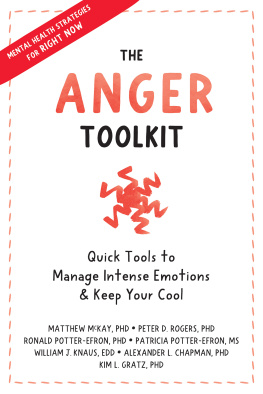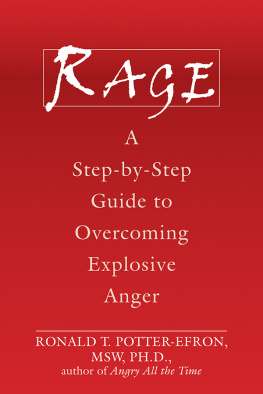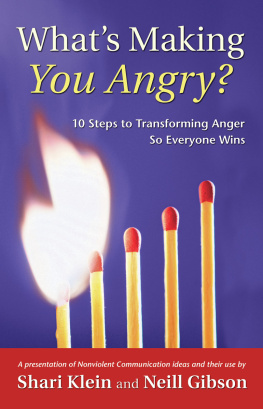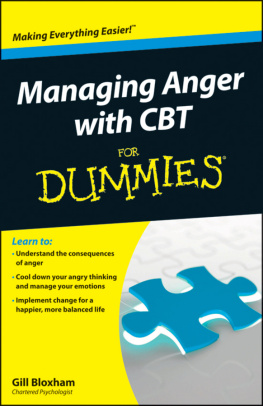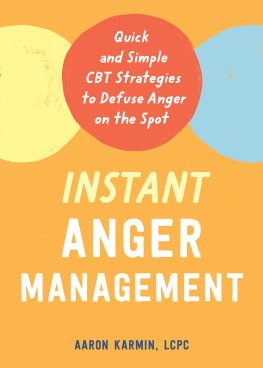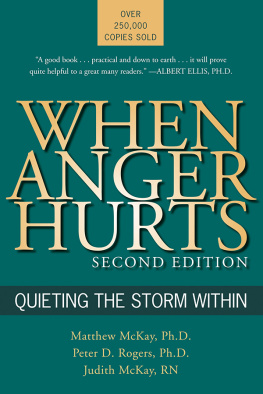THE

GUIDE TO
ANGER
MANAGEMENT
Proven techniques to understand and control anger
Robert Puff, PhD, and James Seghers, PhD
Featured by MSNBC, WebMD.com, and Psychology Today

Avon, Massachusetts
Dr. Seghers: I dedicate this book to my wife, Helen Berlin.
Dr. Puff: I dedicate this book to my father, Robert Puff, Sr.
Contents
Top Ten Telltale Signs of an Anger Problem
- Do you experience or express your anger in a manner that is out of proportion with the triggering event?
- Have you ever hurt yourself, in any way, with your temper?
- Do you feel angry when you think about certain times, events, or significant people in your life?
- Have you noticed that you always have this feeling of anger, tension, or irritability?
- Do people walk on eggshells around you?
- Do you feel (or fear) being out of control when you are angry?
- Have you lost or damaged a relationship, job, or something else important because of your anger?
- Do you take out your anger on someone or something else rather than the person or situation that is bothering you?
- How many people have you alienated with your temper?
- Has anyone ever told you that you have an anger problem? Have you heard it more than once and from different people?
Introduction
IF YOURE READING THIS introduction, you probably have an anger problem, or know someone who does. Youre not alone. Most people have struggled with anger at some point in their lives. Many great leaders in human history, from Alexander the Great to Steve Jobs, have struggled with issues of temper and rage. Having an anger problem doesnt mean you are bad person, are weak, or that your character is flawed. But it is a problem worth addressing. Anger problems can have serious, even fatal consequences.
You have probably seen how destructive out-of-control anger can be. Perhaps youve frightened yourself, or those you love, with episodes of rage. The aggressive, rageful feeling that anger brings can be both intoxicating and frightening. People sometimes convince themselves that anger helpsthat it makes them stronger, more capable, and more respectedbut the realities are hard to ignore. In the wake of protracted anger problems, youll find a trail of broken relationships, shattered careers, health problems, and a lot of unhappiness. Uncontrolled anger destroys lives.
Anger can inspire people to do great things, as in the case of Martin Luther King Jr., who used his anger about injustice to pursue positive social change. Anger can also be quite dangerous. Anger is the hottest of the hot emotions, and has the power to induce otherwise kind and respectable people to behave very badly. Consider what you know of history and world events from the perspective of anger. How many wars, atrocities, and injustices have been committed under the banner of rage? On a more personal level, think of how anger has played out in your life, and in the lives of people you know. It isnt always a pretty picture.
Today, more than ever, people look around and find many reasons to get upset. Economic problems, school violence, partisan politics, the pressures of an increasingly fast-paced society, even urban drift. If you talk with other people about this, you will likely find a consensus that anger problems are getting worse. In addition, the level of stress people experienceone of the important causes of angeris getting worse, not better.
The good news is that anger problems are solvable. You dont have to struggle with anger for the rest of your life, and you certainly dont have to reinvent the wheel. Psychologists know considerably more about anger than they did even a generation ago. The current scientific understanding of what anger is, what causes it, and the associated risks has reached a highly developed level. At the same time, a tremendous amount of work has been done to figure out what works and what doesnt from the perspective of managing and preventing problematic anger. Bringing you this information in a coherent, easy-to-use manner is the central purpose of this book.
The Everything Guide to Anger Management is shaped by four key areas of emphasis:
Emphasis on psychological science: Wherever possible, an effort has been made to present the most up-to-date scientific information.
Emphasis on practicality: The book was written so that you can engage in a self-directed anger management program, as opposed to requiring direct guidance. Much of the material is presented progressively, so that more advanced techniques on anger control and prevention build on more basic concepts and strategies. This allows you to apply techniques very quickly while continuing to learn.
Emphasis on breadth: Many topic areas are discussed, providing a comprehensive picture. Common difficulties and stumbling blocks are anticipated and addressed. Most importantly, a great variety of approaches are presented for learning the actual management, control, and prevention of anger.
Emphasis on flexibility: This book affords considerable flexibility regarding the implementation of an anger management program. Most of the techniques can be used on their own, but they can also be combined with other principles and techniques. You have all the information necessary to design an anger management program that fits your unique needs, situation, and personality.
Learning to manage anger is a challenge, but it is very achievable, and very rewarding. There is no area of your life that will not be improved by learning to better manage and control your own emotions. In taking this journey, you will find that the benefits extend well beyond a reduction of problematic anger. In the bigger picture, you will find that you grow as a person, that your life is more peaceful, and that you are more effective in your relationships.
CHAPTER 1
Anger Is Important
You may consider anger to be an all-around negative emotion, but this is not true. Anger is a protective emotion that helps people defend themselves against physical and psychological threats. Considered a whole-person phenomenon, anger is expressed emotionally, cognitively, physically, and behaviorally. While anger can occur for many different reasons, it always involves three factors: a triggering event, characteristics of the individuals personality, and a particular interpretation of the situation. Because anger can be very subjective, it can also be controlled.
This Emotional Life
Emotions allow you to experience the highs of excitement, joy, and love, and the depths of anguish, guilt, and sorrow. In a word, emotions are visceral. They convey a sense of immediacy and truth. Your emotions reflect you as an individual, who you are and where youve been, and they mirror your unique relationship with the world, incorporating the information you receive (and your processing of that information) moment by moment. Emotions exert a powerful influence on behavior. Strong emotions can cause you to act in a way that you might not normally or to avoid situations that you generally enjoy. So much of what makes life wonderful and poignant and frustrating is reflected in your emotional experience.


